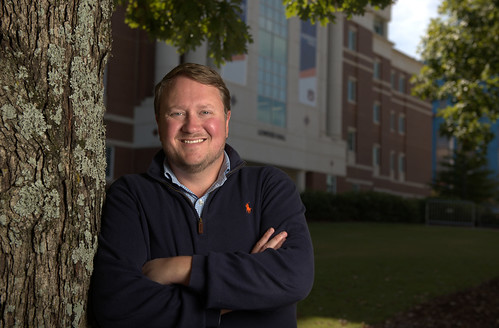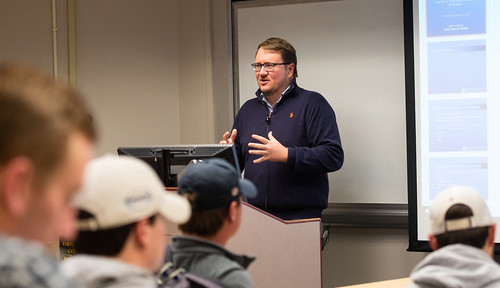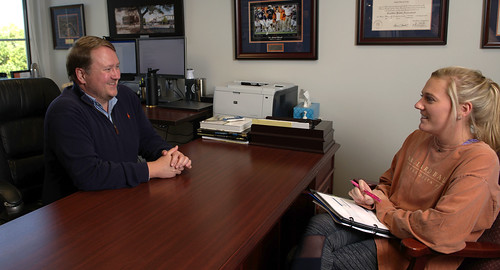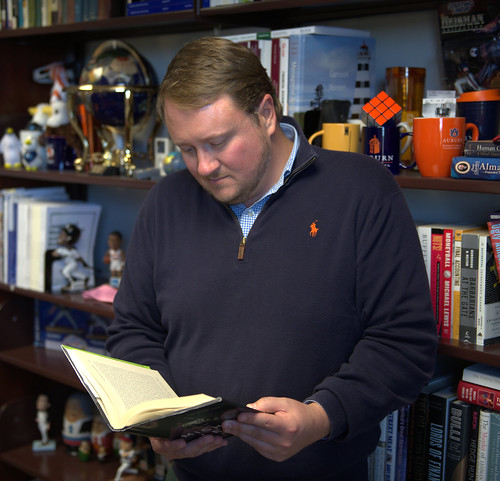Accounting professor honored with teaching awards
Article body
Like most accountants, James Long knows that being exact is essential in this profession where only one bottom line is correct. But when it comes to teaching the subject he loves, he understands that multiple teaching methods are required to reach different students.
“Teaching is not one size fits all,” Long said. “To be successful, I’ve found that I need to adopt a student-centric approach, meeting each student where he or she is with respect to understanding a topic, and tailoring my explanations to their learning style. One of the most rewarding aspects of teaching is helping a student grasp a complicated concept that he or she initially struggled to understand.”
In recognition of Long’s inspirational teaching ability, Auburn University recently honored him with the Gerald and Emily Leischuck Endowed Presidential Award for Excellence in Teaching—Auburn’s highest teaching honor—and the Alumni Undergraduate Teaching Excellence Award.
Long serves as the Harbert College Advisory Council Professor in the School of Accountancy in the Harbert College of Business and is a two-time Auburn graduate, earning a bachelor’s degree in 2001 and master’s in 2002. After graduation, he discovered a passion for teaching when he had a chance to lead continuing professional education classes, causing him switch to a career in education after three years as an accounting professional. Long returned to academia to pursue his doctorate at Virginia Tech, graduating in 2009 and joining the Auburn faculty that same year.
Using real-life examples to explore interesting aspects of accounting is what helps many students have those breakthrough moments. “Although accounting is typically perceived as a very dry field, my colleagues and I do our best to make it interesting by finding unique and entertaining scenarios to bring into the classroom,” he said.
Long and his School of Accountancy colleagues frequently publish case studies to help students think beyond the basic debits and credits. One recent case described a restaurant with a unique tradition in which patrons personalize a dollar bill and staple it to a surface in the restaurant. Students must address the legal, financial accounting, tax and auditing issues arising from this tradition. “Is the money income? Should the business owner pay taxes on it?” Long asked. “These are just a few of the questions students must research.”
In addition to bringing accounting to life in the classroom, Long stresses to current and prospective students that accounting is a fantastic marketable degree that provides an excellent foundation that allows them to work in any industry. “There are many different options within industry, government and private practice,” he said. “You are not locked in. You can change industries or positions. Accounting provides job security, a lot of opportunities and flexibility.”
Long bases his teaching philosophy on three core tenets of the Auburn Creed: the importance of the human touch; work, hard work; and honesty and truthfulness.
“As an Auburn student, I benefitted immensely from the investment the Auburn faculty made in me throughout, and after, my academic career, both personally and professionally,” he said. “As a member of the Auburn faculty, I have sought to devote the same level of care to the development of deep and meaningful relationships with my students. My colleagues and I focus on preparing them for personal and professional success upon graduation.”
He firmly believes that students benefit from “work, hard work” as stated in the creed.
“Without hard work, they cannot master the technical accounting knowledge or develop the work ethic required to succeed in the accounting profession and in their other personal and professional endeavors,” he said.
Integrity is a core principle of the accounting profession, too, and Long holds his students to high standards of academic honesty and truthfulness. “I provide them with opportunities to confront ethical dilemmas and moral quandaries from the safety of the classroom, without the high stakes consequences that often accompany these issues in the real world.”
He also lets students know he will not lower his academic standards to help them achieve “meaningless success” in the classroom. Rather, he invests his time and effort to help them rise to the challenge and fulfill their potential.
“Unearned success may help a student get a foot in the door with an employer, but it will do them no favors once they leave the academic setting,” he said. “Employers expect them to arrive with a firm grasp of the knowledge they were meant to have accumulated during their academic career.”
Outside the classroom, Long encourages his students to participate in service learning outreach projects, such as the SaveFirst Initiative that gives students the opportunity to serve as volunteer tax return preparers for low income tax payers. Many students also participate in study abroad trips with Long, who serves as the director of international programs for the School of Accountancy. Most recently they traveled to Brazil and will soon go to Hungary, where Long just completed a semester abroad as a Fulbright Scholar.
Long’s students and colleagues, he says, are very special to him and deserve to share the accolades of the teaching awards.
“These awards really reflect the wonderful quality of our students who are eager to learn and work hard to be successful and the high standards of teaching excellence my faculty mentors and colleagues in the School of Accountancy have set over the years. I have been blessed to work with such a great group of faculty and students here in the School of Accountancy. In addition, it is very special to be recognized at the university level because we have so many great faculty at Auburn. However, the most meaningful aspect of winning these awards was reading the nomination letters from former students and my colleagues, because I got to hear how I’ve impacted their lives through my teaching,” he said.
Related Media
Media interested in this story can contact Communications Director Preston Sparks at (334) 844-9999 or preston.sparks@auburn.edu.
Auburn University is a nationally ranked land grant institution recognized for its commitment to world-class scholarship, interdisciplinary research with an elite, top-tier Carnegie R1 classification, life-changing outreach with Carnegie’s Community Engagement designation and an undergraduate education experience second to none. Auburn is home to more than 30,000 students, and its faculty and research partners collaborate to develop and deliver meaningful scholarship, science and technology-based advancements that meet pressing regional, national and global needs. Auburn’s commitment to active student engagement, professional success and public/private partnership drives a growing reputation for outreach and extension that delivers broad economic, health and societal impact.








